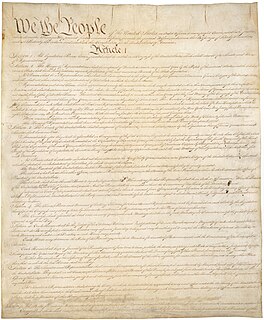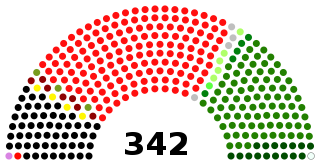Federalism is the mixed or compound mode of government, combining a general government with regional governments in a single political system. Its distinctive feature, exemplified in the founding example of modern federalism by the United States under the Constitution of 1787, is a relationship of parity between the two levels of government established. Federalism can thus be defined as a form of government in which there is a division of powers between two levels of government of equal status.

The politics of Pakistan takes place within the framework established by the constitution. The country is a federal parliamentary republic in which provincial governments enjoy a high degree of autonomy and residuary powers. Executive power is vested with the national cabinet which is headed by the prime minister, who works coherently along with the bicameral parliament and the judicature. Stipulations set by the constitution provide a delicate check and balance of sharing powers between executive, legislative, and judicial branches of the government.

The Constitution of the United States is the supreme law of the United States of America. The Constitution, originally comprising seven articles, delineates the national frame of government. Its first three articles embody the doctrine of the separation of powers, whereby the federal government is divided into three branches: the legislative, consisting of the bicameral Congress ; the executive, consisting of the president ; and the judicial, consisting of the Supreme Court and other federal courts. Articles Four, Five and Six embody concepts of federalism, describing the rights and responsibilities of state governments, the states in relationship to the federal government, and the shared process of constitutional amendment. Article Seven establishes the procedure subsequently used by the thirteen States to ratify it. It is regarded as the oldest written and codified national constitution in force.

The Eighth Amendment of the United States Constitution prohibits the federal government from imposing excessive bail, excessive fines, or cruel and unusual punishments. This amendment was adopted on December 15, 1791, along with the rest of the United States Bill of Rights. The phrases in this amendment originated in the English Bill of Rights of 1689.

The Tenth Amendment to the United States Constitution, which is part of the Bill of Rights, was ratified on December 15, 1791. It expresses the principle of federalism and states' rights, which strictly supports the entire plan of the original Constitution for the United States of America, by stating that the federal government possesses only those powers delegated to it by the United States Constitution. All remaining powers are reserved for the states or the people.
The Thirteenth Amendment may refer to the:
The Fourteenth Amendment may refer to:
The Fifteenth Amendment may refer to the:
The Eighth Amendment to the Constitution of Pakistan allowed the President to unilaterally dissolve the National Assembly and elected governments. The Majlis-e-Shoora amended the Constitution of Pakistan in 1985 and the law stayed on the books until its repeal in 1997.

The Constitution of the Islamic Republic of Pakistan, also known as the 1973 Constitution, is the supreme law of Pakistan. Drafted by the government of Zulfiqar Ali Bhutto, with additional assistance from the country's opposition parties, it was approved by the Parliament on 10 April and ratified on 14 August 1973.

The Constitution of India is the supreme law of India. The document lays down the framework demarcating fundamental political code, structure, procedures, powers, and duties of government institutions and sets out fundamental rights, directive principles, and the duties of citizens. It is the longest written constitution of any country on earth. B. R. Ambedkar, chairman of the drafting committee, is widely considered to be its chief architect.
The Eighteenth Amendment may refer to:

The Prime Minister of Pakistan is the head of government of Pakistan and designated as the "chief executive of the Republic".
The Seventeenth Amendment may refer to the:

The National Assembly or Aiwān-e-Zairīñ Pākistān is the lower legislative house of the bicameral Majlis-e-Shura, which also comprises the Senate of Pakistan. The National Assembly and the Senate both convene at Parliament House in Islamabad. The National Assembly is a democratically elected body consisting of a total of 336 members, before 25th amendment they used to be 342' who are referred to as Members of the National Assembly (MNAs), of which 272 are directly elected members and 70 reserved seats for women and religious minorities. A political party must secure 137 seats to obtain and preserve a majority.

The Parliament of Pakistan is the federal and supreme legislative body of Pakistan. It is a bicameral federal legislature that consists of the Senate as the upper house and the National Assembly as the lower house. According to the constitution of the Islamic Republic of Pakistan, the President of Pakistan is also a component of the Parliament. The National Assembly is elected for a five-year term on the basis of adult franchise and one-man one-vote. The tenure of a Member of the National Assembly is for the duration of the house, or sooner, in case the Member dies or resigns. The tenure of the National Assembly also comes to an end if dissolved on the advice of the Prime Minister or by the president in his discretion under the Constitution.

The Constitution of the People's Republic of Bangladesh is the constitutional document of Bangladesh. It was adopted on 4 November 1972 and effective from 16 December 1972. It provides the framework of the Bangladeshi republic with a parliamentary government, fundamental human rights and freedoms, an independent judiciary, democratic local government and a national bureaucracy. The constitution includes references to socialism, Islam, secular democracy and the Bengali language. It commits Bangladesh to “contribute to international peace and co-operation in keeping with the progressive aspirations of mankind”. The constitution has several controversial elements like Article 70.

The Constitution of California is the primary organizing law for the U.S. state of California, describing the duties, powers, structures and functions of the government of California. California's original constitution was drafted in both English and Spanish by American pioneers, European settlers, and Californios and adopted at the 1849 Constitutional Convention of Monterey, following the American Conquest of California and the Mexican-American War and in advance of California's Admission to the Union in 1850. The constitution was amended and ratified on 7 May 1879, following the Sacramento Convention of 1878-79.

The Reconstruction Amendments are the Thirteenth, Fourteenth, and Fifteenth amendments to the United States Constitution, adopted between 1865 and 1870, the five years immediately following the Civil War. The last time the Constitution had been amended was with the Twelfth Amendment more than 60 years earlier in 1804. The Reconstruction amendments were important in implementing the Reconstruction of the American South after the war. Their proponents saw them as transforming the United States from a country that was "half slave and half free" to one in which the constitutionally guaranteed "blessings of liberty" would be extended to the entire populace, including the former slaves and their descendants.
The Constitution Act, 2017 was a proposed amendment to the Constitution of Pakistan which aimed to restore military courts. The amendment would be an extension of the expired Twenty-first Amendment to the Constitution of Pakistan.









